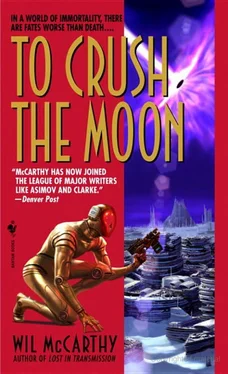Conrad’s heart leaped at the sight—they looked fine! In fact they looked beautiful , much better than they ever had onboard the starship. Over the years of that bitter journey Eustace in particular had grown into a fine, clever, resilient woman, with no way to express or define herself except in terms of the mission. But there she was, standing out over a crowd of strangers like she’d been doing it all her life. Xmary, by contrast, had started as a socialite and become a spacer mainly by accident. She looked even better, even more at home, even more smugly pleased with herself. Mission accomplished!
The three of them were dressed in wellcloth togas of superabsorber black—“sun cloth” it was sometime called, for it could absorb and store many kilowatt-hours of solar energy, and then release it at night to warm the wearer and light her way. Their hair had been cropped close, in a way that gracefully emphasized their age somehow. Conrad felt immediately self-conscious about his own unruly mop, but at least he had combed it. At least he’d let Sandra pick out a pair of pants and a shirt for him—plain, but tasteful.
“If you insist on putting yourselves in harm’s reach,” Xmary was calling down to a crowd of hundreds, “you should at least prepare yourselves for what’s to come. That’s just my advice, but you’d do well to listen. You need to study this group’s tactics. Does anyone here have combat experience?”
No hands went up, although many a nervous foot was shuffling on the cement.
“What’s she doing?” Sandra asked quietly, turning a funny look on Conrad.
“Preparing a defense,” Conrad said, as though it were the most obvious thing in the world. Which of course it was; if they truly had been marked for death, then he and his friends had best gird their loins for battle. And with these young’uns hanging around, there were only three options: evict, recruit, or watch them die in the crossfire. Drowned, most likely; the easiest thing to do with a platform like this was to sink it with all hands aboard, then pick off the survivors as they swam. Would Fatalists discriminate between targets and bystanders? It seemed unlikely.
“But that’s the Constabulary’s job,” Sandra protested. “Or the local police for this jurisdiction.”
“Then where are they?” Conrad asked. “If they want to help, that’s fine, but we’re not going to sit around waiting.” And then it dawned on him that that was exactly what Sandra—what the Queendom authorities and probably the Fatalists themselves—expected the refugees to do. He laughed and said, “In the colonies, miss, one learns to take care of problems as early and as thoroughly as possible.”
“But—”
Whatever she was about to say, it got cut off when Xmary noticed Conrad at the back of the crowd. Her stern face brightened immediately, and she whooped, then put her hands on the railing and vaulted over.
The crowd fell back a step, gasping. The fall was only four meters, and Xmary’s bones and joints were woven through with wonders. She could fall twice that far without serious injury. On Earth, with its higher gravity and thinner atmosphere than Sorrow, the terminal velocity was higher as well, but if she didn’t mind a repair trip through the fax she could conceivably survive a fall from any height. So could a squirrel; there was nothing especially miraculous about it.
Nor was Xmary particularly reckless, or athletic, or consumed by the need to show off. She just didn’t like to waste time. Especially now that they were off the ship, and time actually meant something again. She wanted her husband! The real irony was that Barnard’s morbidity filters had been exported to the Queendom; most of these kids were probably as indestructible as she was. Had they never tested their limits? Did they even know what was inside them?
In any case, they parted like water as Conrad’s wife fell toward them, her toga flapping up, clearly exposing her navel, her black underpants, her navy tattoo. She landed heavily on her sandaled feet, dropping into a crouch with one hand down in front of her and the other up in the air, for balance. “Hello, darling,” she said, grinning.
“Hi there,” he returned, stepping up to offer his hand. “I like what you’ve done with your hair.”
The kids enjoyed that; their silence fell away into cheers and hoots and catcalls. They liked it even better when she rose to a standing position, reached for the ruff of Conrad’s shirt, and pulled him in for a kiss. Then, pulling away, she looked around and addressed them all again. “Let’s reconvene in an hour. Right now I have more pressing business.”
And who, in an immorbid society where hormones raged in young and old alike, could fail to understand that ? With a smile so wide it must have hurt, Xmary took Conrad’s hand and pulled him toward the building’s entrance. The crowd cheered.
“But weapons are illegal ,” Sandra Wong was saying. She was in one of the apartments—Conrad’s, apparently—standing primly while Conrad and Xmary, Eustace and Feck sprawled on the bed. A dozen of the kids, whom Xmary had identified as potential leaders, sat on the tables and chairs and floor, watching the exchange with interest. Sandra gestured at the small fax machine built into one of the walls. “This thing won’t even print them for you. And why should it?”
“Anything can be a weapon,” Feck pointed out reasonably. And Conrad had to smile, because Yinebeb Fecre—aka Feck the Facilitator—had improvised his way through more sudden skirmishes than Sandra could possibly imagine. Like Conrad, he had sent his share of bodies to the Cryoleum, and to the even more final crematorium of Barnard’s stellar furnace. “We could stage an impromptu golf tournament. I don’t know about you, but my aim with a golf ball is pretty good. I suspect our collective aim, with hundreds of golf balls, is even better.”
“But why would you do such a thing?” Sandra wanted to know.
“To stay alive?” Feck suggested.
“But your patterns have been safely archived. Everyone’s have. All you’d be doing is disturbing the crime scene, making it harder for the authorities to determine what happened.”
“We’re supposed to let them kill us?” Eustace Faxborn asked, more in confusion than genuine horror. “We’re supposed to trust our lives to a backup system that we haven’t personally tested? I’m sorry, miss, that’s nonsense.”
Eustace had spent virtually her entire life aboard Newhope , trusting nothing, testing everything, and fixing whatever she could. She was a no-nonsense kind of gal; when their nav solutions were corrupted and they’d suddenly realized they were drifting into a dust shoal, she’d hardly batted an eye. When the nav lasers were overwhelmed, and then damaged, and then ground to dust themselves, she’d shrugged and run diagnostics on the ertial shield. And when the ship was holed and tumbled and coming apart, she’d simply called out, “Cryo tubes,” because that was the final backup. When all else fails, leave a good-looking corpse.
“There’s no law against self-defense,” Xmary told Sandra Wong. “I looked it up. In fact, under maritime law, which applies here, you’re even allowed to defend a stranger’s life ‘with all necessary force and means.’”
“But that’s crazy,” Sandra said. Like Eustace, she seemed more perplexed than upset at the misunderstanding. “I think each one of you needs to consult with your own caseworker and hash out an activity path that leads away from violence.”
Xmary was about to object, but really, Sandra Wong was the ranking authority here. And while Conrad had no particular awe for authority—he’d led his share of mutinies and rebellions over the years—he did at least know enough to work with them, until such time as you were working against them.
Читать дальше












